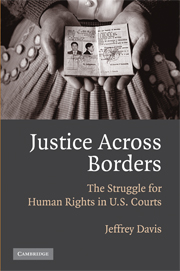Book contents
- Frontmatter
- Contents
- Acknowledgments
- JUSTICE ACROSS BORDERS
- 1 The Seeds of Legal Accountability
- 2 Competing Forces in the Struggle for Accountability: An Overview of the Issues Entangling ATS Litigation
- 3 Human Rights Entrepreneurs: NGOs and the ATS Revolution
- 4 Separation of Powers and Human Rights Cases
- 5 No Safe Haven: Human Rights Cases Challenging Foreign Countries and Nationals
- 6 Holding Corporations Accountable for Human Rights Violations
- 7 Sorting through the Ashes: Testing Findings and Predictions through Quantitative Analysis
- 8 Impacts and Conclusion
- Index
- References
4 - Separation of Powers and Human Rights Cases
Published online by Cambridge University Press: 05 June 2012
- Frontmatter
- Contents
- Acknowledgments
- JUSTICE ACROSS BORDERS
- 1 The Seeds of Legal Accountability
- 2 Competing Forces in the Struggle for Accountability: An Overview of the Issues Entangling ATS Litigation
- 3 Human Rights Entrepreneurs: NGOs and the ATS Revolution
- 4 Separation of Powers and Human Rights Cases
- 5 No Safe Haven: Human Rights Cases Challenging Foreign Countries and Nationals
- 6 Holding Corporations Accountable for Human Rights Violations
- 7 Sorting through the Ashes: Testing Findings and Predictions through Quantitative Analysis
- 8 Impacts and Conclusion
- Index
- References
Summary
CASES AGAINST THE UNITED STATES
In October 2001, Jamal Al-Harith, a British father of three, traveled to Pakistan to study Muslim culture. On a drive to Turkey, his car was intercepted by armed men near the Afghan border. There, Al-Harith was arrested by Taliban forces and accused of being a spy for Great Britain. He was imprisoned in Kandahar, Afghanistan, where the Taliban tortured him. When the Taliban fell to U.S. and allied forces Al-Harith was released. He immediately sought help from British embassy officials in an effort to get home. Before arrangements could be made, however, U.S. forces arrested him and transported him to the U.S. detention facility at Guantánamo Bay, Cuba. There, according to Al-Harith and other detainees, they were subjected to
various forms of torture, which include hooding, forced nakedness, housing in cages, deprivation of food, forced body cavity searches, subjection to extremes of heat and cold, harassment in the practice of their religion, forced shaving of religious beards, placing the Koran in the toilet, placement in stress positions, beatings with rifle butts, and the use of unmuzzled dogs for intimidation.
These men asserted that “Shortly before [their] arrival in Guantánamo Bay in December 2002, defendant Donald Rumsfeld signed a memorandum approving more aggressive interrogation techniques that allegedly departed from the standards of care normally afforded military prisoners.”
- Type
- Chapter
- Information
- Justice Across BordersThe Struggle for Human Rights in U.S. Courts, pp. 89 - 163Publisher: Cambridge University PressPrint publication year: 2008

